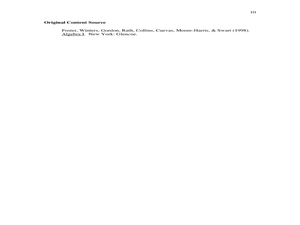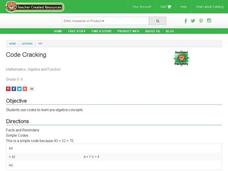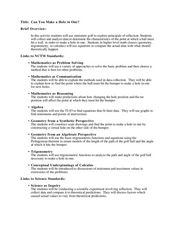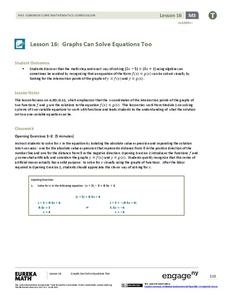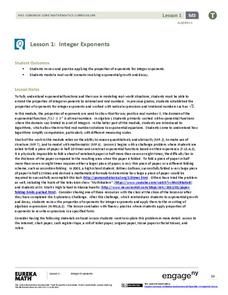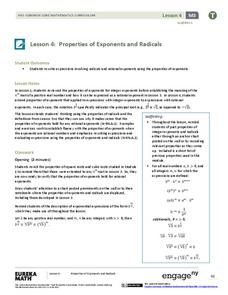Mathematics Vision Project
Quadratic Equations
Through a variety of physical and theoretical situations, learners are led through the development of some of the deepest concepts in high school mathematics. Complex numbers, the fundamental theorem of algebra and rational exponents...
Curated OER
Which Method Will You Choose? Finding Solutions to Systems of Equations.
Ninth graders investigate systems of linear equations. In this Algebra I activity, 9th graders determine which method is the best for solving a systems: graphing, substitution, or elimination. Students choose a method and create a...
Curated OER
Slopes and Linear Equations
Students find the slopes of linear functions. For this graphing lesson, students analyze linear equations and calculate the slope of the line. They graph a line given the slope and y-intercept.
Curated OER
Code Cracking
There is nothing more engaging than cracking a secret code! Middle schoolers will replace letters with numbers to solve problems. This game will help them to begin to understand algebra questions by finding the value of missing numbers....
Curated OER
Cantilevers
Learners perform an experiment to find the linear relationship between the appllied weight and the bend of the cantilever. In this linear relationships instructional activity, students follow detailed directions to set up an experiment....
Curated OER
Beginning Algebra Lesson
Learners discuss how to add simple Algebra problems such as: 2x + 2x = 4x or 3x + 3x + 6x = 12x or 3(2x + 4x) = 3(6x) = 18x. They then examine how to do these problems by writing down examples on the board before Students do their...
Curated OER
Linear Equations and Algebraic Symbols
Students rewrite word problems using the correct symbols. In this algebra instructional activity, students simplify algebraic expressions and use the correct representation of the unknown. They solve equations using one and two steps...
Curated OER
Discovering Math: Concepts in Algebra
Students learn that speed is a function of time and distance, a quadratic equation can be used to figure out the path of fireworks, a photographer can use Algebra to figure out how many rolls he can afford if he needs twice as much of...
Curated OER
Linking Algebra to Temperature
Students convert between two units as they calculate the temperature. In this algebra lesson, students collect data on seasonal climate and create a graph. They make conjectures based on their data collection.
Curated OER
Algebra I - Test
Students participate in a lesson that reviews the concept of linear functions in connection with preparation for an exam. The teacher reviews problems with the students for scaffolding. Students practice graphing linear functions.
Curated OER
Can You Make a Hole in One?
Young scholars relate miniature golf to reflection of an image. In this algebra lesson plan, students collect and graph data as they study linear equations. They apply properties of graphing to solve real life scenarios.
Curated OER
Solve Simple One-Step Linear Equation
Sixth graders solve one unknown number by using hands-on manipulatives after being introduced to the history of abstract mathematics through literature.
Curated OER
Algebra—Quadratic Equations and Functions
Students use given information on wind speed with the quadratic formula to determine the pressure of the wind on a building. In this quadratic equations lesson, students compute the pressure of the wind from two data tables. They graph...
Soft Schools
Long Division Worksheets
They say practice makes perfect. If that's the case then these worksheets will have young mathematicians perfectly solving long division problems in no time.
EngageNY
Successive Differences in Polynomials
Don't give your classes the third degree when working with polynomials! Teach them to recognize the successive differences and identify the degree of the polynomial. The instructional activity leads learners through a process to develop...
EngageNY
Graphs Can Solve Equations Too
There are many equations Algebra I students are not ready to solve. Graphing to solve gives them a strategy to use when they are unsure of an algebraic approach to solve the problem. The lesson exposes learners to a wide variety of types...
EngageNY
Putting It All Together
Shuffle 'em up and deal! Learners practice operations with polynomials using cards they pass around the room. The activity works with pairs or individuals, so it offers great flexibility. This is the fifth installment in a series of 42...
EngageNY
Integer Exponents
Fold, fold, and fold some more. In the first installment of a 35-part module, young mathematicians fold a piece of paper in half until it can not be folded any more. They use the results of this activity to develop functions for the area...
EngageNY
The Remainder Theorem
Time to put it all together! Building on the concepts learned in the previous lessons in this series, learners apply the Remainder Theorem to finding zeros of a polynomial function. They graph from a function and write a function from...
EngageNY
The Definition of a Parabola
Put together the pieces and model a parabola. Learners work through several examples to develop an understanding of a parabola graphically and algebraically.
EngageNY
Properties of Exponents and Radicals
(vegetable)^(1/2) = root vegetable? The fourth installment of a 35-part module has scholars extend properties of exponents to rational exponents to solve problems. Individuals use these properties to rewrite radical expressions in terms...
EngageNY
Four Interesting Transformations of Functions (Part 3)
Continue the study of transformations with an examination of horizontal stretches, shrinks, and reflections. Individuals use the same process used in parts one and two of this series to examine horizontal changes. The resource also...
EngageNY
Solving and Graphing Inequalities Joined by “And” or “Or”
Guide your class through the intricacies of solving compound inequalities with a resource that compares solutions of an equation, less than inequality, and greater than inequality. Once pupils understand the differences, the lesson...
EngageNY
Integer Sequences—Should You Believe in Patterns?
Help your class discover possible patterns in a sequence of numbers and then write an equation with a lesson that covers sequence notation and function notation. Graphs are used to represent the number patterns.




